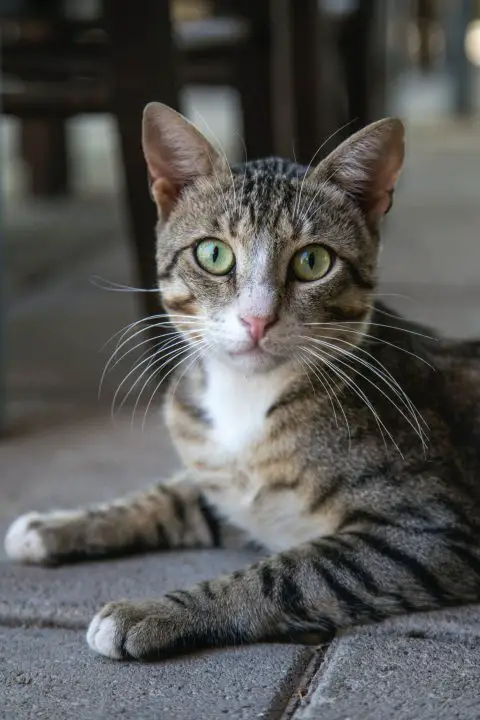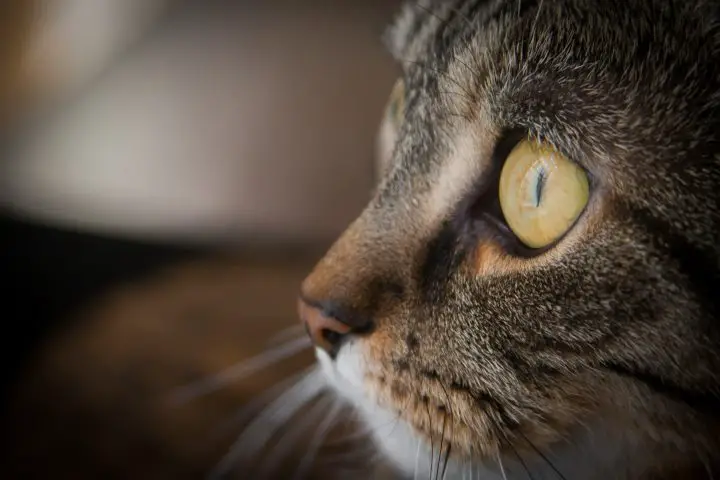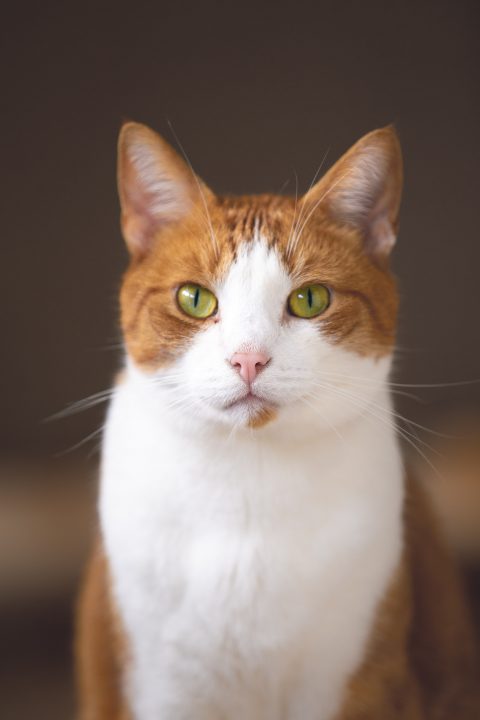When you notice something unusual on your cat, it can cause you to feel anxious or worried. If your cat is losing hair around their eye, you understandably want to know what is happening and whether your cat is going to be OK. There are a few different causes for a cat losing hair in corner of eye. In the next few sections, I’ll share a few possible explanations to help you understand what is causing your kitty’s hair loss.

Table of Contents
- Why is my cat losing fur around his eyes?
- What causes facial alopecia in cats?
- What To Do if Your Cat Has Facial Alopecia
- Cat Hair Loss Around Eyes
- FAQs
Why is my cat losing fur around his eyes?
It is only natural to worry about your cat; they’re part of the family, after all! If you notice your cat panting after playing or see them acting strange, you’re going to be concerned for their health and well-being. Similarly, if you’ve noticed your cat balding above eyes, you’ll want to find out what is going on.
Preauricular alopecia is the term used to refer to cat hair loss around their eyes. It may also be referred to as facial alopecia.
Alopecia is the scientific term for hair loss. Preauricular translates to “before the ear.” So, Preauricular alopecia refers to hair loss between the ears and eyes.
If you are asking, “how do I fix my cats bald spot” or want to know what causes facial alopecia, keep reading.
What causes facial alopecia in cats?
So, what can cause a cat losing hair in corner of eye? There can be a number of possible reasons your cat is losing hair around their eyes. These include:
- Normal growth and aging
- Allergies
- Fleas
- Stress
- Genetics
- Ringworm

Normal Growth and Aging
Often, the answer to “why is my cat losing fur on her face,” is simpler than you may expect. Hair loss around the eyes sometimes can be completely normal and nothing to worry about.
Cats grow as they age. Sometimes their fur coat needs to spread out a bit to keep up with the growth of the rest of the body. If the fur on their face spreads out due to growth and aging, it can make it appear like there are bald spots or areas with thinning hair.
If your cat’s hair is thinning due to aging, don’t worry. There is nothing that needs to be done.
However, the tricky part is that you may not be able to tell whether the hair loss is normal or something of concern. Read through the other possible causes below. If you’re concerned that one of these more serious issues is to blame, contact your cat’s veterinarian.
Allergies
If you’ve noticed that your cat losing hair near tear duct or other areas around the eye, it could also be caused by allergies. Cats who are allergic to a specific food, pollen, dust, or other allergen can feel itchy and irritated, just as we do.
If your cat’s eye area is itchy, they may try to scratch it to find relief from the itch. If your cat scratches themselves, they may end up pulling out some of their fur, resulting in the bald patches you’ve seen.
Fleas
Fleas are a common answer to the question “why is my cat losing hair and has scabs?” Bites from fleas can cause cats to be very itchy. Scratching themselves to relieve the itch can result in hair loss. If fleas are on your cat’s head, and they’re typically all over the body, then it is perfectly reasonable for there to be hair loss around their eyes.
Stress
Do cats lose fur when stressed? Yes, stress sometimes causes a cat to overgroom herself. Overgrooming can cause hair loss. If you are concerned that stress is the cause for your cat’s facial alopecia, try to determine what is causing the stress and work to remedy it. You can also contact your veterinarian if you don’t see any improvement.
This video will help you learn more about stress in cats and what you can do to alleviate the stress your kitty is feeling.
Genetics
Genetics may also be the reason behind your cat losing hair on ears and above eyes. According to some experts, there is a connection between hair loss and a cat’s genes. In these instances, the hair loss isn’t anything to be concerned about and won’t require any treatment. Siamese, Birman, and Devon Rex appear to be some of the breeds most likely to be impacted by genetic hair loss.
Ringworm
Black cat bald spots above eyes may also be caused by ringworm.
Ringworm is a type of fungal infection that feeds on a cat’s dead cells. It can cause hair loss when it reaches the cat’s hair shafts by breaking them. This will result in bald patches. If your cat has ringworm, you may be able to see small red rings if you look closely at the patches on their skin.
Do cat eye infections go away on their own? Sometimes ringworm and other infections can clear themselves up, but often they will not. It is best to bring your cat to the vet for treatment. The vet will likely prescribe an antifungal oral medication along with a topical ointment to help your cat heal and kill the spores.
What To Do if Your Cat Has Facial Alopecia
Now that we know some of the possible causes for facial alopecia in cats, you may have some more questions. What is the best home treatment for cat hair loss? How can I get my cats fur to grow back? These are all very valid questions, but the answer will vary based on the underlying cause of the hair loss.
If you are not sure what is causing your cat’s facial alopecia, your first act should be to schedule an appointment with their veterinarian. They can help you determine the cause and recommended or prescribe an appropriate cat hair loss treatment,

Cat Hair Loss Around Eyes
If you’ve been asking, “why is my cat losing fur around his eyes,” I hope you’ve found the answers you’re looking for. As I shared above, hair loss around the eyes is often just a normal part of the aging process for cats. However, it can also be an indication of other health issues. If you suspect a medical issue is to blame for your cat’s hair loss, you should contact their veterinarian right away.
FAQs
Hair loss in the area between a cat’s eyes and ears could be due to several reasons. It can be allergies/infections, parasites, over grooming, injury/trauma, or medical conditions.




